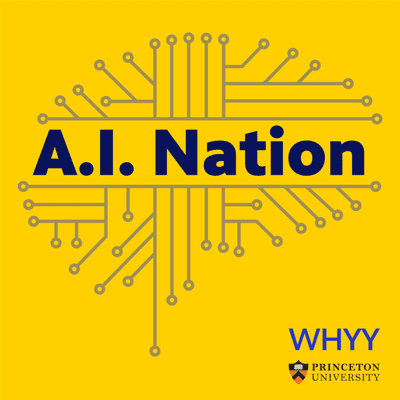
Probeer 7 dagen gratis
€ 9,99 / maand na proefperiode.Elk moment opzegbaar.
Alle afleveringen
7 afleveringenThis is an episode of another WHYY podcast called The Pulse [https://whyy.org/programs/the-pulse/]. In a lot of ways, artificial intelligence acts as our personal butlers — it filters our email, manages the temperature in our homes, finds the best commute, shapes our social media, runs our search engines, even flies our planes. But as AI gets involved in more and more aspects of our lives, there are nagging fears. Will AI replace us? Make humans irrelevant? Make some kind of terrible mistake, or even take over the world? On this episode, we hear from scientists and thinkers who argue that we should look at AI not as a threat or competition, but as an extension of our minds and abilities. They explain what AI is good at, and where humans have the upper hand. We look at AI in three different settings: medicine, work, and warfare, asking how it affects our present — and how it could shape our future.
We examine AI’s role in polarizing America, from online echo chambers to the virulent spread of misinformation on social media. How did AI influence the attack on the Capitol? How do social media algorithms work, and what’s their goal? We’ll talk with a reporter who witnessed the violent effects of misinformation first-hand; talk to a reporter and researcher who’s created tools to crack open the black boxes of social media algorithms, and hear from an author who explains how Facebook groups are particularly polarizing. (Read the transcript for this episode [https://whyy.org/transcript-echo-chambers-a-i-nation/].)
AI systems can be highly susceptible to bias. The potential for serious consequences is huge, especially when it comes to the AI increasingly used in police departments. We’ll hear from a man wrongfully arrested due to facial recognition technology, and from a lawyer researching how “dirty data” has corrupted predictive policing algorithms. We’ll also hear from the creator of one of these predictive policing systems, and an AI researcher who says de-biasing AI isn’t enough. (Read the transcript for this episode [https://whyy.org/transcript-biased-intelligence-a-i-nation/].)
Sophisticated AI tools played a major role in our fight against the COVID-19 pandemic, from developing drugs and vaccines, to aiding medical research, and coordinating healthcare providers. We’ll look at the huge expansion of AI capability in just the last few years, and consider what a pandemic response could look like in 100 years. We’ll talk to a professor and founder of a science competition to use AI to solve the “protein folding problem,” and hear how the new AI system Alphafold helped one biologist solve a decades long problem in half an hour. We’ll also hear from residents of a country that successfully used AI to extinguish the spread of COVID-19, and how Americans could do it, too (but probably won’t). (Read the transcript for this episode [http://whyy.org/transcript-the-next-pandemic-a-i-nation].)
Drones, Driverless Cars, and Automated Weaponry. Increasingly, we’re putting AI in the driver’s seat, physically, with autonomous vehicles. We’ll consider the progress, safety, security, and ethical implications of machines that remove the human factor. (Read the transcript for this episode [https://whyy.org/transcript-a-i-in-the-drivers-seat-a-i-nation/].)
Probeer 7 dagen gratis
€ 9,99 / maand na proefperiode.Elk moment opzegbaar.
Exclusieve podcasts
Advertentievrij
Gratis podcasts
Luisterboeken
20 uur / maand



















